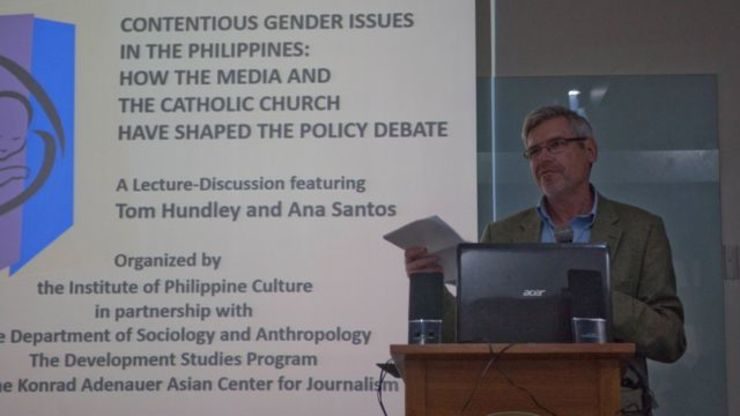SUMMARY
This is AI generated summarization, which may have errors. For context, always refer to the full article.

MANILA, Philippines – When Pope Francis makes his first visit to the Philippines next year, he will be visiting a country that has passed a historic reproductive health (RH) law despite the fierce and vocal opposition of the influential Catholic Church.
He will also be visiting a country where thousands of women choose to have an abortion every year – 90% of them Catholic, according to research – and who tend to rationalize their decisions by painting an idea of a more forgiving God.
Filipino women who choose to have an abortion tend to view their choice as self-indulgent, said Tom Hundley, editor of the Pulitzer Center on Crisis Reporting.
In a forum on gender issues, media framing, and the Catholic Church on Monday, November 24, Hundley said this mindset was in stark contrast to pro-choice activists in the United States, whose rallying cry was “Our body, our choice.”
An understanding God
According to researchers from the Guttmacher Institute and the University of the Philippines Population Institute, over 470,000 induced abortions were performed in the Philippines in 2000.
Most of the women (68%) were poor. Based on the research, 90% of the women are Catholic, and around 70% have some high school education. (READ: A hard look at abortion in the PH)
The Philippine Catholic Church is strongly opposed to abortion, which forms its primary basis for opposing the RH law. The law allows the use of public funds to provide contraception, to implement age-appropriate sex education, and to improve maternal health care, among others.
Critics say the law is anti-life, but proponents have pointed out that it does not promote abortion, and will in fact benefit the thousands of poor mothers who die from birthgiving-related causes every year.
In a predominantly Catholic country where faith and religion play a central role in daily life, choosing to go against the Church means social pressure.
For Hundley, these factors contribute to women’s reluctance to own their right to make a choice about their bodies.
“The key word, choice, seems to strike women here as self-indulgent. If a woman in this country seeks an abortion, she is making a choice in which she has to [consider] other factors,” he said.
Hundley added that to reconcile themselves with the act, women who choose to have an abortion will often create an idea of a more forgiving, understanding god.
“The women seeking abortion would create a process of rationalization. [They would think], ‘I know this is wrong, I know this is a sin, but God understands what I’m doing.'”
‘Radical in action’
Pope Francis has earned a reputation as a more progressive pope, but he has not taken a contrary opinion to the Church’s current stance on abortion.
However, he has urged for a more inclusive, welcoming church, advocating a Church that will serve as a “home for all,” especially for unmarried mothers, remarried divorcees, and gays.
In September last year, Pope Francis took the spotlight with the publication of his comments where he said that the Church has become ‘obsessed’ with abortion, gay marriage, and contraception.
These comments have made waves in international media, but Hundley said it has not yet made a huge impact on the local church.
“I expected that [those comments] would have had a bigger impact here, but I haven’t seen that play out,” he added.
For Mary John Mananzan, a Missionary Benedictine sister and former chairperson of the Association of Major Religious Superiors of the Philippines, it is the Pope’s emphasis on love over dogma that has endeared him to many.
During a forum on religion, politics, and the role of women in the Catholic Church last Friday, Mananzan said, “I don’t think he’s radical – he’s very orthodox actually in his teachings – but he’s very radical in action.” (READ: Forum set: What Church will Pope see in Philippines?)
“He says, ‘I don’t want a church that is always moralizing. What I want the church to be is to heal wounds and to put warmth in the heart of people.’ Wow. If that is our gospel, that truly is a gospel of joy,” Mananzan added. – Rappler.com
Join Rappler in a 100-day countdown to Pope Francis’ visit to the Philippines: a journey from the Vatican to Tacloban. Tweet us your thoughts using the hashtag #PopeFrancisPH!
Add a comment
How does this make you feel?
There are no comments yet. Add your comment to start the conversation.